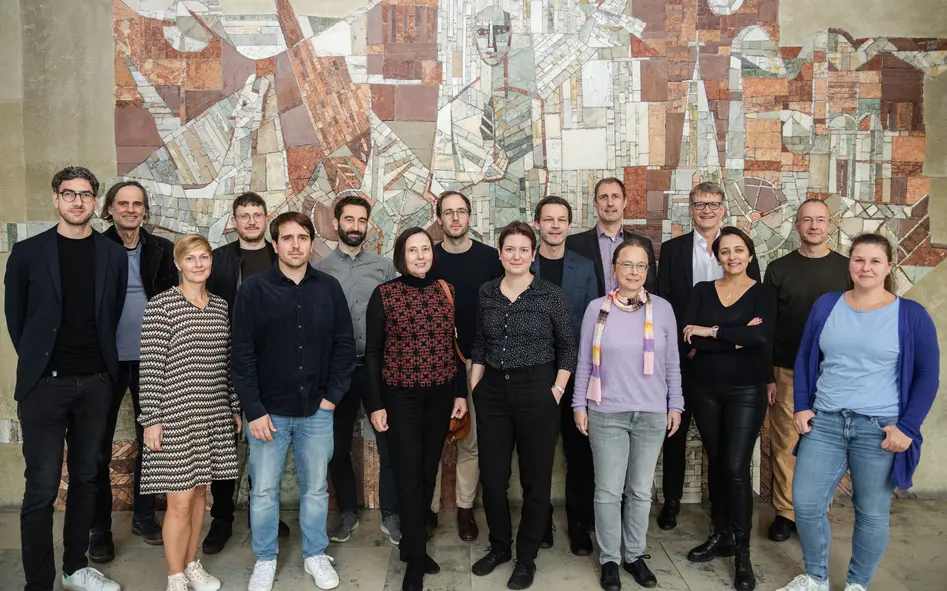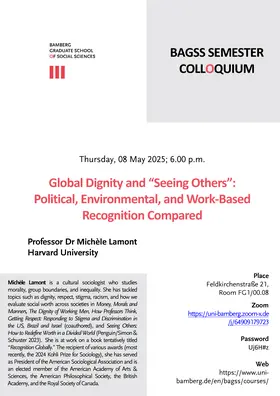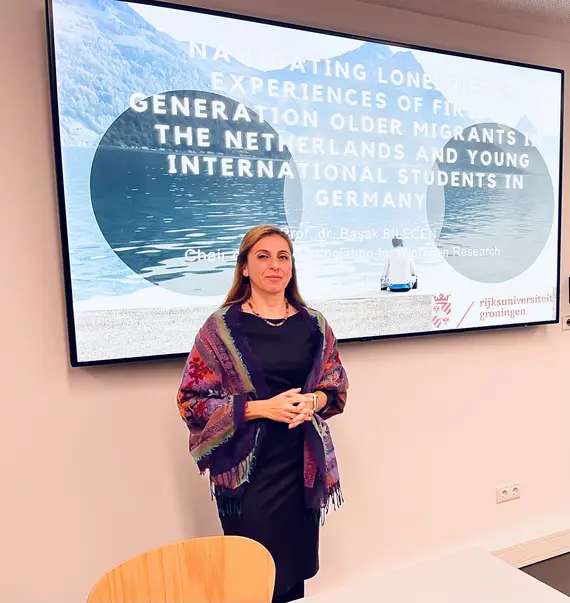Institut für Soziologie
Zum 14.06.2023 wurde das Institut für Soziologie an der Universit?t Bamberg gegründet.
Dem Institut für Soziologie als Mitglieder zugeordnet sind die Inhaberinnen bzw. Inhaber s?mtlicher Lehrstühle und Professuren der Bamberger Soziologie sowie deren wissenschaftliche Mitarbeiterinnen und Mitarbeiter.
Institutsleitung
Die Institutsleitung besteht aus den dem Institut angeh?renden Professoren und Professorinnen, der Studiengangsbeauftragten sowie einer Vertreterin bzw. einem Vertreter des Mittelbaus.
Zum gesch?ftsführenden Direktor wurde Prof. Dr. Michael Gebel und zum stellvertretenden gesch?ftsführenden Direktor Prof. Dr. Steffen Schindler gew?hlt.
Die Vertretung des wissenschaftlichen Mittelbau übernimmt Dr. Alexander Patzina, Ersatzvertreterin ist Lea Ahrens.
Institutskolloquium des Instituts für Soziologie
Im Rahmen des Institutskolloquiums finden regelm??ig Vortr?ge statt, um den wissenschaftlichen Austausch und Diskurs zu f?rdern.
Alle Studierenden, Institutsmitglieder und Interessierte sind herzlich eingeladen!
Programm Sommersemester 2025
Termin: Donnerstag, der 08.05.2025; 18:00 Uhr
Ort: FG1/00.08, Feldkirchenstra?e 21
Zoom: https://uni-bamberg.zoom-x.de/j/64909179723 (Password: Uj6H#z)
Michèle Lamontwill discuss her book “Seeing Others: How Recognition Works and How it Can Heal a Divided World” and ongoing collaborative research on whether and how American and British young workers in the “two Manchesters” are searching for recognition through politics; how indigenous people in Canada and Micronesia are seeking recognition through environmental justice and jobs; and the challenge of seeking recognition where it is impossible to obtain.
Michèle Lamont is a cultural sociologist who studies morality, group boundaries, and inequality. She has tackled topics such as dignity, respect, stigma, racism, and how we evaluate social worth across societies in Money, Morals and Manners, The Dignity of Working Men, How Professors Think, Getting Respect: Responding to Stigma and Discrimination in the US, Brazil and Israel (coauthored), and Seeing Others: How to Redefine Worth in a Divided World (Penguin/Simon & Schuster 2023). She is at work on a book tentatively titled “Recognition Globally.” The recipient of various awards (most recently, the 2024 Kohli Prize for Sociology), she has served as President of the American Sociological Association and is an elected member of the American Academy of Arts & Sciences, the American Philosophical Society, the British Academy, and the Royal Society of Canada.
For a sneak peek on her research, you can watch her TED Talk here: https://www.ted.com/talks/michele_lamont_how_to_heal_a_divided_world
Termin: Mittwoch, der 25.06.2025, 18:00 Uhr
Ort: FMA/00.07
Dr. Chen-Hao Hsu will discuss the rise of intensive parenting in developed countries, its social consequences, and its impact on work and family life. Despite increasing research, little is known about how parenting patterns evolve over time and across generations. His presentation will introduce a quantitative life course approach to studying couple-level parenting behaviors, explore theoretical frameworks on its effects, and address methodological challenges in empirical research.
Over the past few decades, people’s time spent on parenting and childcare has increased remarkably in developed countries across Europe, North America, and East Asia. Such a social trend has triggered considerable debates on the development and social consequences of intensive parenting, including how parenting is stratified by gender or social class, how parental wellbeing and intimate relationship are affected by parenting, and how parenting affects child development. Despite the rising attention on intensive parenting, our knowledge about how couple’s parenting pattern evolves over time since the parenthood and how it changes across generation is still limited. Furthermore, there are insufficient discussions on the impacts of parenting on people’s work and family behaviors, including their post-parenthood employment, further childbirth, and family dissolution (divorce or separation). Drawing on these gaps, this presentation will advocate a quantitative method to examine the couple-level parenting behaviors from a life course perspective. It will also discuss the theoretical framework of the impact of intensive parenting on work/family outcomes and the methodological challenges for empirical researchers on this topic.”
Dr. Chen-Hao Hsu is a Ph.D. graduate in Sociology from the University of Bamberg. His research focuses on family demography and labor market dynamics with a comparative perspective on East Asia and Europe. Currently, he works on the DFG-funded project "Women's Agency and Fertility in Egypt" and teaches at the University of Bamberg.
Programm vorangegangener Semester
Prof. Dr. Ba?ak Bilecen (Unviversit?t Groningen), Internationale Diversity-Gastprofessorin an der Universit?t Bamberg, machte am 3. Dezember 2024 den Auftakt für das neue Institutskolloquium und pr?sentierte ihre Forschung zu ?Navigating Loneliness: Experiences of First-Generation Older Migrants in the Netherlands and Young International Students in Germany“. Der Vortrag stie? auf gro?es Interesse und führte zu einer engagierten Diskussion mit den Professorinnen, Professoren, Mitarbeitenden, Promovierenden und Studierenden des Instituts für Soziologie.




